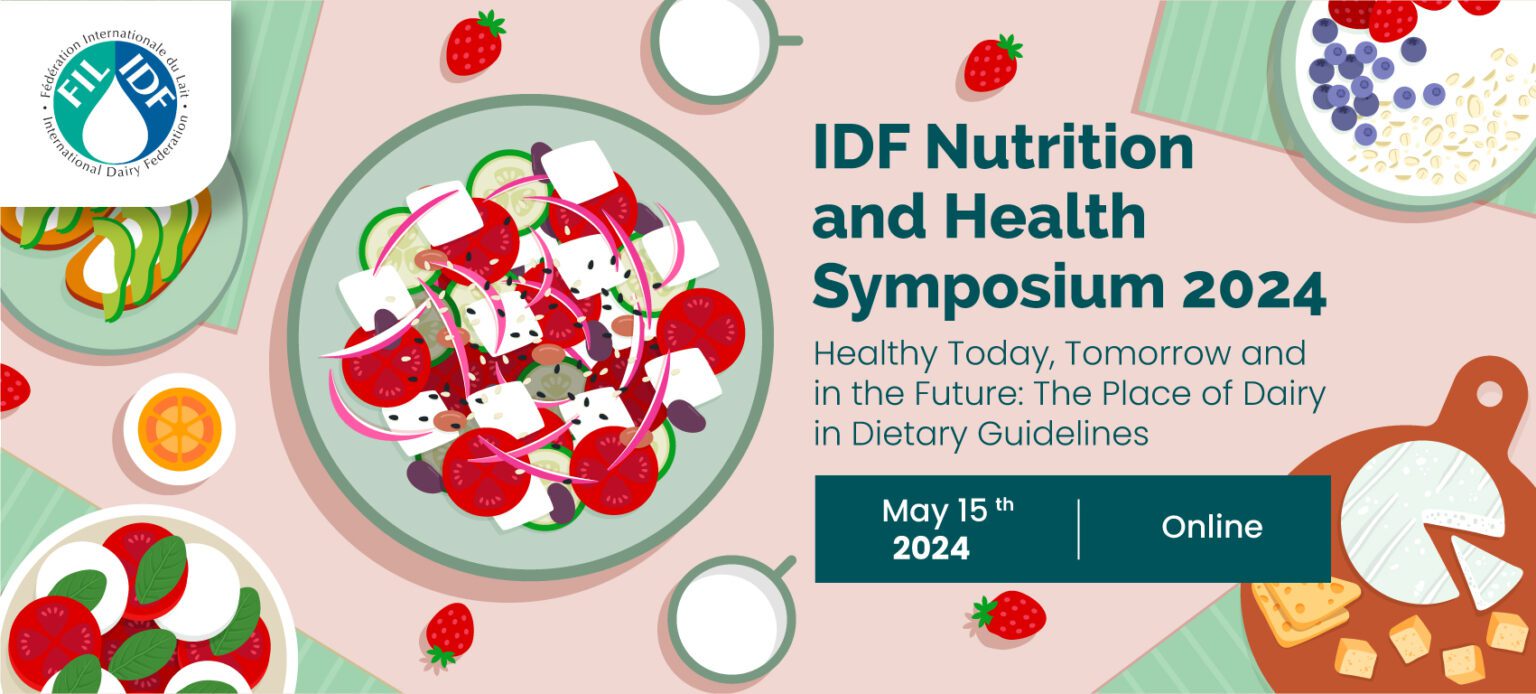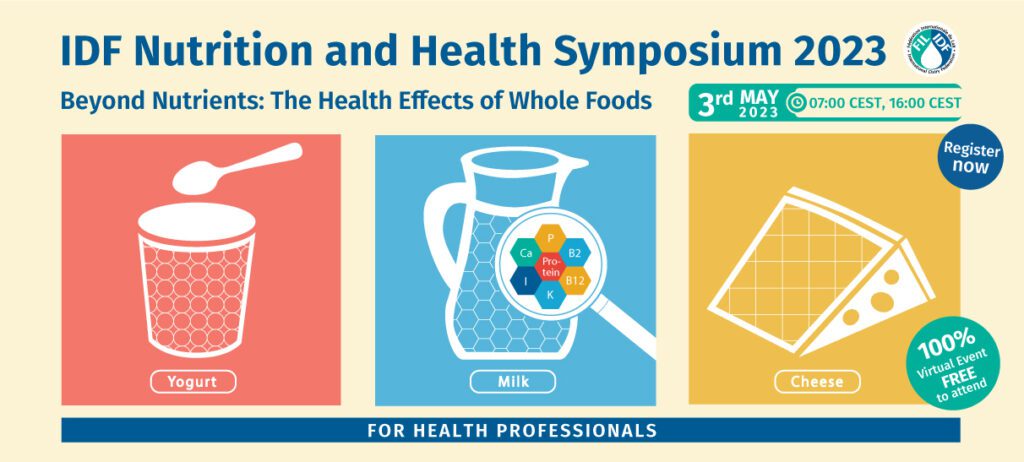On 15 May, IDF organised its fourth annual IDF Nutrition and Health Symposium 2024 with a focus on the role of dairy in dietary guidelines around the world within a comparative approach. “Healthy Today, Tomorrow and in the Future: the place of Dairy in Dietary guidelines” was the theme chosen for this edition. For the second year, the Symposium was broadcasted at two different times to allow audiences from different hemispheres to choose the hour that best suited their time zone and availability to attend. The event had over 1,100 registrants and 400 participants. During the symposium a new IDF Factsheet on the importance of dairy in dietary guidelines was released.
At her introductory remarks IDF Director General, Ms Laurence Rycken, said: “Food-Based Dietary Guidelines provide the backbone for government recommendations on achieving a healthy balanced diet, shaping nutrition education initiatives and food policies around the world. National guidelines are tailored to suit cultural preferences, food and nutrition security, and aim to reduce the risk of diet-related diseases.”
At his turn, the World Health Organization Director of the Department of Nutrition and Food Safety, Dr Francesco Branca, highlighted the importance of having healthy diets for the promotion of wellbeing and prevention of non-communicable diseases. He also stressed that, when composed of a diversity of foods, healthy diets provide adequate nutrients at all ages and in all physiological statuses.
Compliance with Food Based Dietary Guidelines is associated with a reduced carbon footprint in many countries; however, the carbon footprint could increase depending on which food groups are under or over consumed was one of the key messages of Dr Sinead McCarthy, Senior Research Officer at Teagasc Food Research Centre in Ireland. “To date, animal sourced foods have been the focus for reducing the carbon footprint of diets, however discretionary foods – which are not part of the core food groups in dietary guidelines, contribute similar amounts of CO2 and provide little in terms of nutrition”, Dr McCarthy explained.
“The Food-Based Dietary Guidelines were first published in South Africa in 2003 and revised in 2012. The inclusion of a dairy guideline in South Africa’s revised Food-Based Dietary Guidelines was motivated by the nutrient-dense profile of dairy, notably its low sodium content, high potassium and calcium ratio” highlighted Professor Corinna Walsh of the University of the Free State, during her presentation entitled “Dietary recommendations in South Africa versus consumption data”.
Dr Stephan van Vliet, Assistant Professor of Nutrition Science, Utah State University highlighted the complementary nature of plant and animal-sourced foods to address micronutrient deficiencies and hidden hunger: “Plant-based foods are rich in certain micronutrients like vitamin C and dietary fiber, while animal-sourced foods provide highly bioavailable iron, zinc, vitamin B12, and essential fatty acids. By leveraging this complementary nature, we can reduce micronutrient deficiencies globally”, he reasoned.
Focusing on the different characteristics of animal sourced and plant-based foods, Dr Natalie Ahlborn from Massey University in New said: “Compared to many other foods, the micronutrient availability in dairy is presented in a digestible form resulting in high levels of absorption, which contributes to high bioavailability. Milk does not contain anti-nutritional factors such as oxalate or phytate, which are common in plant-based products and can otherwise limit the absorption of micronutrients such as calcium, magnesium, and zinc”.
Referring to the place of dairy in Chinese Dietary Guidelines, Professor Guansheng Ma from the Peking University in China explained: “While the initial version of the Chinese Dietary Guidelines released in 1989 did not include recommendations for dairy consumption, subsequent versions from 1997 to the latest edition in 2022 consistently advocate for increased dairy intake. The 2022 guidelines suggest a daily dairy intake of 300-500 grams for adults and 300 grams for children.”
“The development of the latest Chinese dietary guidelines was guided by several principles, including the importance of basing guidelines on foods rather than nutrients, reliance on scientific evidence, prioritization of pressing nutrition and health issues, adoption of a balanced dietary pattern as the core concept, consideration of residents’ nutritional needs and food culture, and a focus on food system sustainability”, remarked Professor Guansheng Ma.
A new IDF Factsheet on the role of Dairy in Dietary Guidelines
During the Symposium, IDF published the Factsheet of the IDF Number 40/2024 “Developing Evidence-Based, Food-Based Dietary Guidelines: Critical Contributions of Dairy”.
The purpose of this factsheet is to provide context and rationale for addressing the evolving recommendations surrounding dairy in global Food-Based Dietary Guidelines. It highlights the importance of including nutrient-dense foods, specifically dairy foods, based on credible scientific evidence.
As Ms Ashley Rosales, leader of the IDF Acton Team on Dairy place on Food-Based Dietary Guidelines and Nutrition & Industry Affairs Officer at Dairy Council of California highlighted in her concluding remarks and presentation of the factsheet: “Food-Based Dietary Guidelines, established around the world by governmental authorities and health authorities need to comprise evidence-based recommendations for healthy eating patterns and lifestyle choices”.
“Food-based dietary guidelines are powerful tools for promoting nutrition security and also for overall health and wellbeing at the population level. The absence of standardized dietary guidelines underscores a significant challenge, with substantial variability observed between countries in their recommendations regarding dairy consumption”, she added.
Ms Ahsley Rosales concluded “the new IDF factsheet provides context and rationale for addressing the evolving recommendations surrounding dairy in global food-based dietary guidelines. Also, it highlights the importance of including nutrient dense foods and specifically dairy foods for their numerous contributions to healthy people and thriving communities.”
The new IDF Factsheet can be downloaded here.










